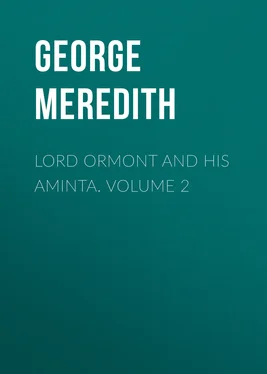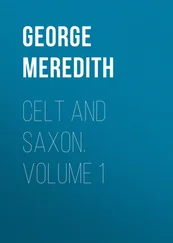George Meredith - Lord Ormont and His Aminta. Volume 2
Здесь есть возможность читать онлайн «George Meredith - Lord Ormont and His Aminta. Volume 2» — ознакомительный отрывок электронной книги совершенно бесплатно, а после прочтения отрывка купить полную версию. В некоторых случаях можно слушать аудио, скачать через торрент в формате fb2 и присутствует краткое содержание. Жанр: foreign_prose, literature_19, foreign_antique, на английском языке. Описание произведения, (предисловие) а так же отзывы посетителей доступны на портале библиотеки ЛибКат.
- Название:Lord Ormont and His Aminta. Volume 2
- Автор:
- Жанр:
- Год:неизвестен
- ISBN:нет данных
- Рейтинг книги:3 / 5. Голосов: 1
-
Избранное:Добавить в избранное
- Отзывы:
-
Ваша оценка:
- 60
- 1
- 2
- 3
- 4
- 5
Lord Ormont and His Aminta. Volume 2: краткое содержание, описание и аннотация
Предлагаем к чтению аннотацию, описание, краткое содержание или предисловие (зависит от того, что написал сам автор книги «Lord Ormont and His Aminta. Volume 2»). Если вы не нашли необходимую информацию о книге — напишите в комментариях, мы постараемся отыскать её.
Lord Ormont and His Aminta. Volume 2 — читать онлайн ознакомительный отрывок
Ниже представлен текст книги, разбитый по страницам. Система сохранения места последней прочитанной страницы, позволяет с удобством читать онлайн бесплатно книгу «Lord Ormont and His Aminta. Volume 2», без необходимости каждый раз заново искать на чём Вы остановились. Поставьте закладку, и сможете в любой момент перейти на страницу, на которой закончили чтение.
Интервал:
Закладка:
She could have no further voyages. Ridicule convulsed her home of refuge. For the young soldier-hero, to be unhorsed by misfortune, was one thing; but the meanness of the ambition he had taken in exchange for the thirst of glory, accused his nature. He so certainly involved her in the burlesque of the transformation that she had to quench memory.
She was, therefore, having smothered a good part of herself, accountably languid—a condition alternating with fire in Aminta; and as Mr. Morsfield's letter supplied the absent element, her needy instinct pushed her to read his letter through. She had not yet done that with attention.
Whether a woman loves a man or not, he is her lover if he dare tell her he loves her, and is heard with attention. Aware that the sentences were poison, she summoned her constitutional antagonism to the mad step proposed, so far nullifying the virus as to make her shrink from the madness. Even then her soul cried out to her husband, Who drives me to read? or rather, to brood upon what she read. The brooding ensued, was the thirst of her malady. The best antidote she could hit on was the writer's face. Yet it expressed him, his fire and his courage—gifts she respected in him, found wanting in herself. Read by Lord Ormont, this letter would mean a deadly thing.
Aminta did her lord the justice to feel sure of him, that with her name bearing the superscription, it might be left on her table, and world not have him to peruse it. If he manoeuvred, it was never basely. Despite resentment, her deepest heart denied his being indifferent either to her honour or his own in relation to it. He would vindicate both at a stroke, for a sign. Nevertheless, he had been behaving cruelly. She charged on him the guilt of the small preludes, archeries, anglings, veilings, evasions, all done with the eyelids and the mute of the lips, or a skirmisher word or a fan's flourish, and which, intended to pique the husband rather than incite the lover, had led Mrs. Lawrence Finchley to murmur at her ear, in close assembly, without a distinct designation of Mr. Morsfield, "Dangerous man to play little games with!" It had brought upon her this letter of declaration, proposal, entreaty.
This letter was the man's life in her hands, and safe, of course. But surely it was a proof that the man loved her?
Aminta was in her five-and-twentieth year; when the woman who is uncertain of the having been loved, and she reputed beautiful, desirable, is impelled by a sombre necessity to muse on a declaration, and nibble at an idea of a test. If "a dangerous man to play little games with," he could scarcely be dangerous to a woman having no love for him at all. It meant merely that he would soon fall to writing letters like this, and he could not expect an answer to it. But her heart really thanked him, and wished the poor gentleman to take its dumb response as his reward, for being the one sole one who had loved her.
Aminta dwelt on "the one sole one." Lord Ormont's treatment had detached her from any belief in love on his part; and the schoolboy, now ambitions to become a schoolmaster, was behind the screen unlikely to be lifted again by a woman valuing her pride of youth, though he had—behold our deceptions!—the sympathetic face entirely absent from that of Mr. Adolphus Morsfield, whom the world would count quite as handsome—nay, it boasted him. He enjoyed the reputation of a killer of ladies. Women have odd tastes, Aminta thought, and examined the gentleman's handwriting. It pleased her better. She studied it till the conventional phrases took a fiery hue, and came at her with an invasive rush.
The letter was cast back into the box, locked up; there an end to it, or no interdiction of sleep.
Sleep was a triumph. Aminta's healthy frame rode her over petty agitations of a blood uninflamed, as lightly as she swam the troubled sea-waters her body gloried to cleave. She woke in the morning peaceful and mildly reflective, like one who walks across green meadows. Only by degrees, by glimpses, was she drawn to remember the trotting, cantering, galloping, leaping of an active heart during night. We cannot, men or woman, control the heart in sleep at night. There had been wild leapings. Night will lead an unsatisfied heart of a woman, by way of sleep, to scale black mountains, jump jagged chasms. Sleep is a horse that laughs at precipices and abysses. We bid women, moreover, be all heart. They are to cultivate their hearts, pay much heed to their hearts. The vast realm of feeling is open to these appointed keepers of the sanctuary household, who may be withering virgins, may be childless matrons, may be unhusbanded wives. Wandering in the vast realm which they are exhorted to call their own, for the additional attractiveness it gives them, an unsatisfied heart of woman will somewhat audaciously cross the borderland a single step into the public road of the vast realm of thinking. Once there, and but a single step on the road, she is a rebel against man's law for her sex. Nor is it urgent on her that she should think defiantly in order to feel herself the rebel. She may think submissively; with a heart (the enlarged, the scientifically plumped, the pasture of epicurean man), with her coveted heart in revolt, and from the mere act of thinking at all.
Aminta reviewed perforce, dead against her will, certain of the near-to- happiness ratings over-night. She thinned her lips, and her cheeks glowed. An arm, on the plea of rescuing, had been round her. The choice now offered her was, to yield to softness or to think. She took the latter step, the single step of an unaccustomed foot, which women educated simply to feet, will, upon extreme impulsion, take; and it held a candle in a windy darkness. She saw no Justice there. The sensational immensity touched sublime, short of that spirit of Justice required for the true sublime. And void of Justice; what a sunless place is any realm! Infants, the male and the female alike, first begin to know they feel when it is refused them. When they know they feel, they have begun to reflect. The void of Justice is a godless region. Women, to whom the solitary thought has come as a blown candle, illumining the fringes of their storm, ask themselves whether they are God's creatures or man's. The question deals a sword-stroke of division between them and their human masters. Young women, animated by the passions their feeling bosoms of necessity breed, and under terror discover, do not distinguish an abstract justice from a concrete. They are of the tribe too long hereditarily enslaved to conceive an abstract. So it is with them, that their God is the God of the slave, as it is with all but the bravest of boys. He is a Thing to cry to, a Punisher, not much of a Supporter—the Biblical Hebrew's right reading of Nature, favouring man, yet prompt to confound him, and with woman for the instrument of vengeance. By such a maze the blindfolded, are brought round to see Justice on earth. If women can only believe in some soul of justice, they will feel they belong to God—of the two; and the peril for them then is, that they will set the one incomprehensible Power in opposition to the other, urging them unsatisfied natures to make secret appeal away from man and his laws altogether, at the cost of losing clear sight of the God who shines in thought. It is a manner whereby the desperately harried among these creatures of the petted heart arrive upon occasion at an agreeable, almost reposeful, contemplation of the reverse of God.
There is little pleasure to be on the lecture-rostrum for a narrator sensible to the pulses of his audience. Justice compels at times. In truth, there are times when the foggy obscurities of the preacher are by comparison broad daylight beside the whirling loose tissues of a woman unexplained. Aminta was one born to prize rectitude, to walk on the traced line uprightly; and while the dark rose overflowed the soft brown of her cheeks, under musings upon her unlicenced heart's doings overnight, she not only pleaded for woeful creatures of her sex burdened as she and erring, she weighed them in the scales with men, and put her heart where Justice pointed, sending men to kick aloft.
Читать дальшеИнтервал:
Закладка:
Похожие книги на «Lord Ormont and His Aminta. Volume 2»
Представляем Вашему вниманию похожие книги на «Lord Ormont and His Aminta. Volume 2» списком для выбора. Мы отобрали схожую по названию и смыслу литературу в надежде предоставить читателям больше вариантов отыскать новые, интересные, ещё непрочитанные произведения.
Обсуждение, отзывы о книге «Lord Ormont and His Aminta. Volume 2» и просто собственные мнения читателей. Оставьте ваши комментарии, напишите, что Вы думаете о произведении, его смысле или главных героях. Укажите что конкретно понравилось, а что нет, и почему Вы так считаете.












